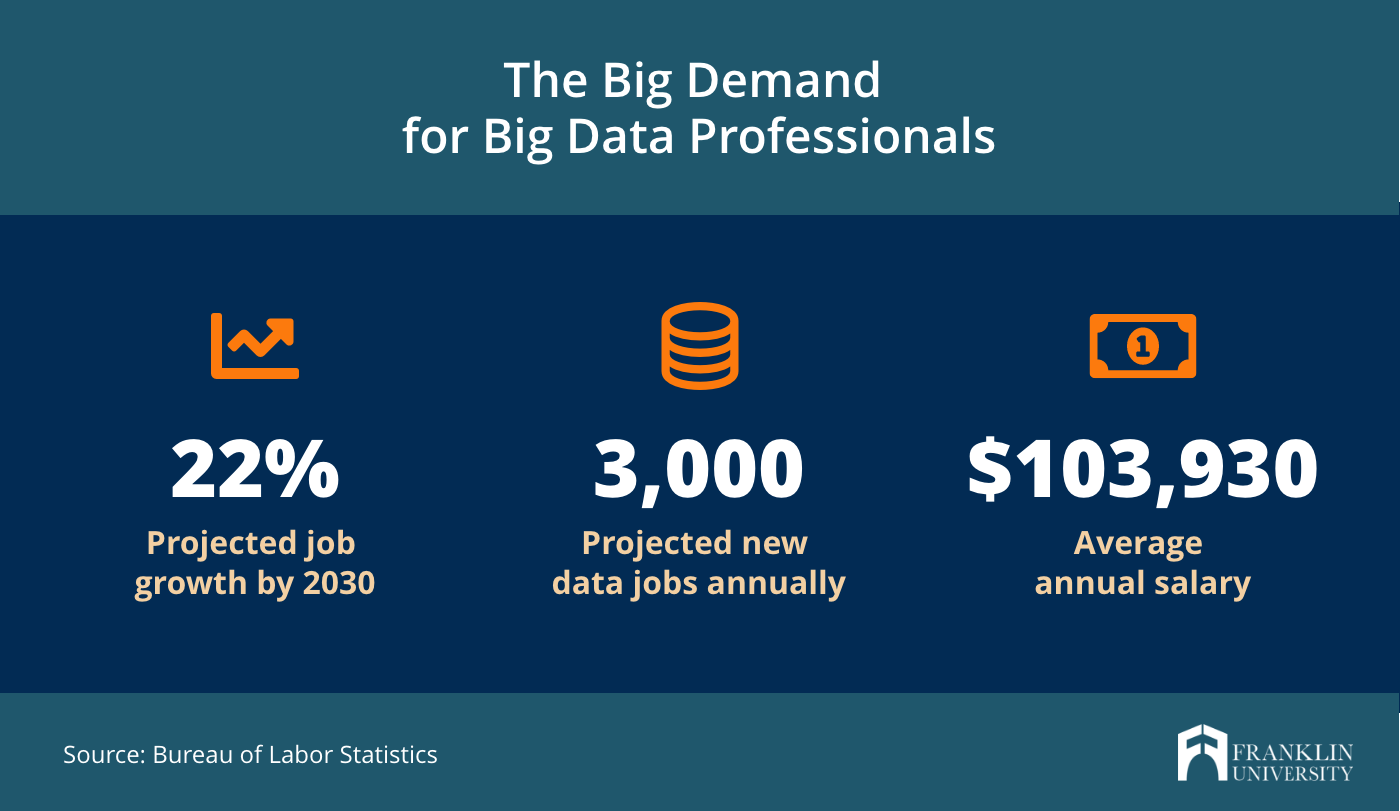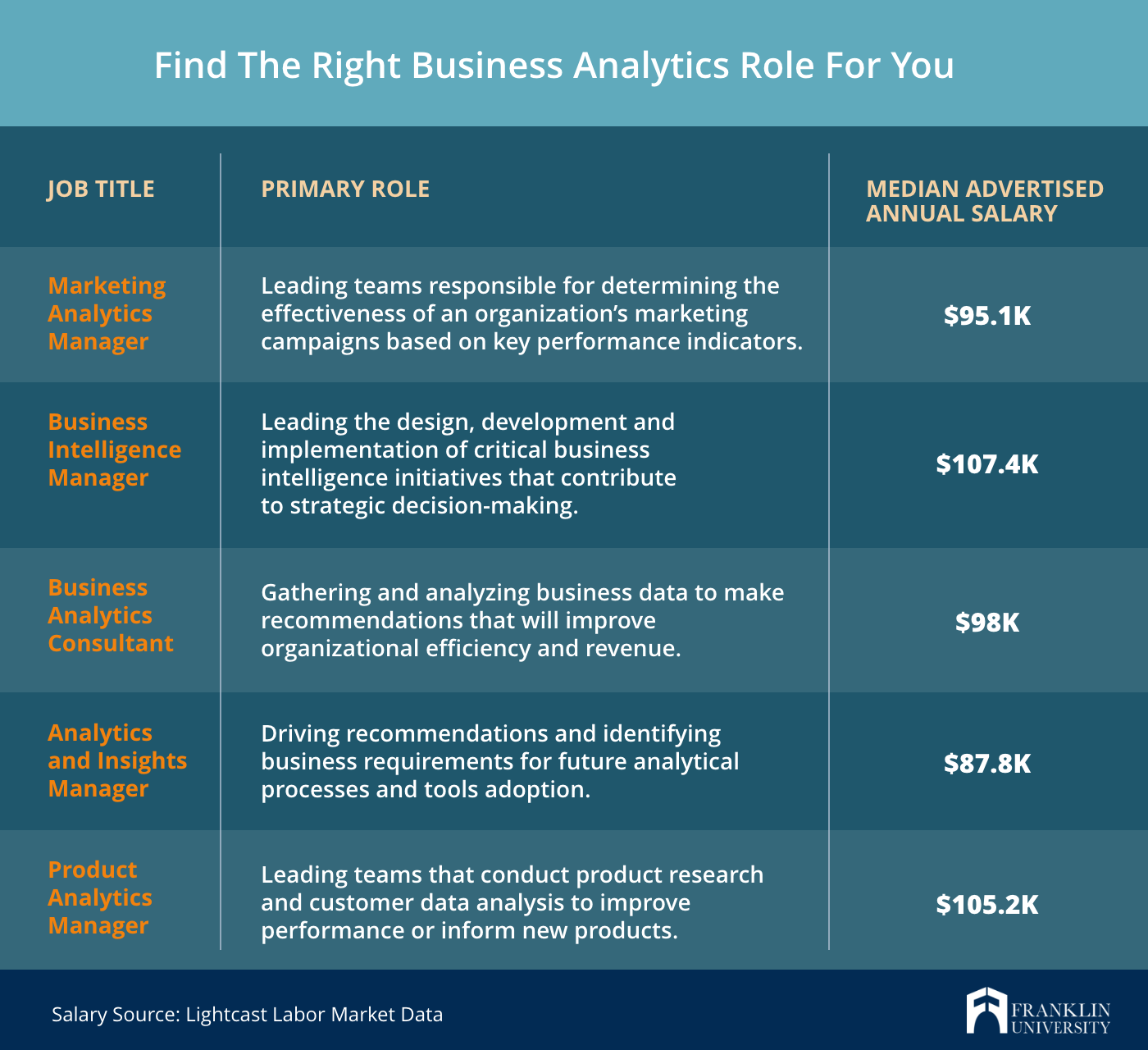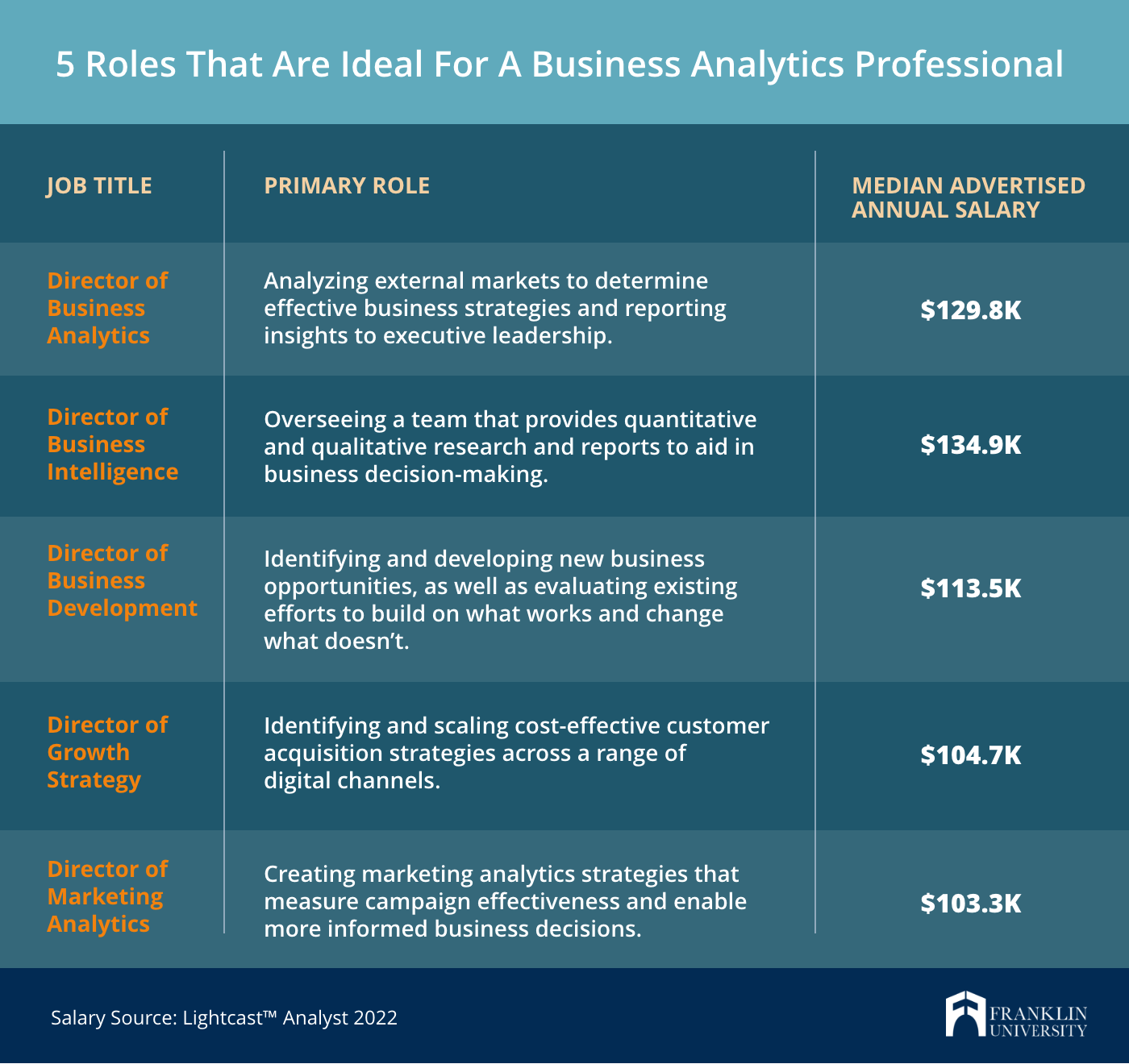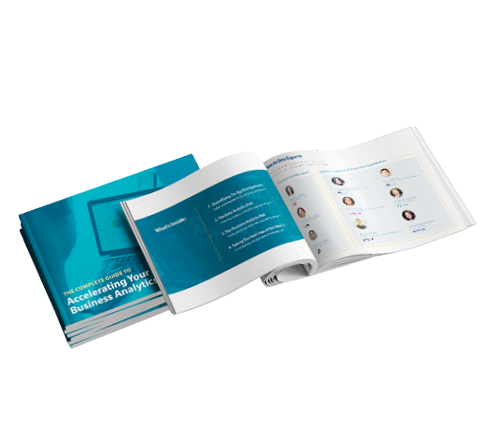Request Information
We're Sorry
There was an unexpected error with the form (your web browser was unable to retrieve some required data from our servers). This kind of error may occur if you have temporarily lost your internet connection. If you're able to verify that your internet connection is stable and the error persists, the Franklin University Help Desk is available to assist you at helpdesk@franklin.edu, 614.947.6682 (local), or 1.866.435.7006 (toll free).
Just a moment while we process your submission.

Business Analyst Career Path: Tips For Finding Success
Businesses are growing reliant on data. While many top companies make data-based decisions about their operations and growth plans, others are still figuring out how to leverage big data to their advantage.
That’s where the business analytics professional comes in.
Whether it’s driving operational efficiencies, informing products or services, improving customer experiences, determining pricing or other facets of business that drive competitive advantages—a business analytics professional drives transformation across a company.
Let’s take a look at the data that drives a business analytics professional’s career. What do they need to succeed? What does the job market look like? Where are there opportunities for growth?
Is Business Analytics a Good Career?
“Thanks to big data technology and cloud computing, the costs of collecting, storing and processing data are dramatically decreasing over time, and data is growing at an exponential rate. More and more business professionals have exposure to data and are required to make data-driven decisions,” says Jiang Li, Ph.D., who serves as chair of the Business Analytics master's program and lead faculty of the Data Analytics master's program at Franklin University.
“As a result, the demand for business analytics professionals is strong.”
Business analytics professionals have a unique ability to understand both business logic and business data. This skill opens up their career path horizontally and vertically.

Five Reasons to Make a Career in Business Analytics
- It’s Industry Agnostic. Business analytics professionals can be found in every industry and across all major business functions including finance, human resources, operations, IT, marketing and more.
- Agents of Change. Whether driving operational efficiencies, informing products and services, improving customer experiences, determining pricing or other facets of business that drive competitive advantages, business analytics professionals drive change across the company.
- Job Security. Not only is there a strong demand for professionals in data-centric roles but the need is growing. That means that there are jobs, and perhaps more importantly, stability.
- A Portable Skill Set. The basic skills needed in this role are the same across industries but where and how those skills are applied can vary based on the company, department, even the project. With the right skill set, it’s easy to transition across the company.
- Creating Opportunity. A growing job market presents a range of opportunities - you can work for a company or even for yourself as a consultant.
Charting a Career Path in Business Analytics
Business analytics is a diverse career field full of opportunity. There are entry-level jobs available for data-driven professionals in every business function. Let’s look at 5 of the most popular business analytics roles for professionals with up to three years of experience.

Get a FREE roadmap that includes insider information to help you maximize the many opportunities in the fast-growing field of Big Data.
Moving Up
Dr. Li suggests, “Some business analytics professionals become more technical and are promoted to a position such as data scientist. Others can be promoted to the executive levels because they have an understanding of both business logic and business data.”
Let’s look at five roles a business analytics professional could grow into.

How to Build A Successful Career in Business Analytics
As you work to begin– and then build – your business analytics professional career, questions are bound to come up. Here are four key tips that can help keep your career trajectory moving in the right direction.
- Master The Skills And Tools Of Business Analytics
To keep up with the pace of change and business demands, today’s employers are looking for business analytics candidates with developed technical and soft skills.- Foundational Skills and Tools
- Database Languages (SQL, etc.)
- Programming Languages (R, Python)
- Data Manipulation (Excel and SAS)
- Forecasting, Budgeting and Financial Analysis
- Business Management Theory
- Data Visualization (Tableau & Microsoft Power BI)
- Presentation and Communication
“You will need an understanding of these tools for reporting, data visualization, financial analysis, or marketing analysis. Basic business analytics programming skills are a plus,” Dr. Li explained.
- Build Your Knowledge Base With a Bachelor’s Degree
A bachelor’s degree is essential for entering the business analytics field. The ideal path for this career would be a Bachelor’s Degree in Business Analytics but according to Lightcast™, only seven universities offered that degree in 2021.
Other options might be to obtain a bachelor’s degree in Business Administration, Financial Management, or Statistics.
When considering where to get your degree, look for a program that provides industry-relevant curriculum with the ability to customize your education program through electives that align with your interests.
- Boost Your Knowledge-Base
The types of data and the ways it is being collected are constantly evolving. To succeed in your role it’s important that you are evolving as well. This means staying current through education, being a part of research organizations, and earning (and maintaining) certifications.
At the beginning of your career, professional certifications can be particularly advantageous, especially if you have little practical work experience.
There are a number of professional credentials that can be earned in the business analytics field including: - Prepare For Advancement With a Master’s Degree
In today’s workplaces, a master’s degree in business administration can prepare professionals with the skills necessary to lead cross-functional or specialized teams. A master’s degree in business analytics is ideal for leaders who want to use data to champion innovation, identify new business opportunities, and improve current products or services to win more customers.
Take Control of Your Career
Education and training are crucial aspects of building a thriving data-driven career. Higher education provides the foundational knowledge and skills that will transcend time, as well as timely credentials that can keep pace with a rapidly changing industry.
Franklin’s M.S. in Business Analytics equips you with the tools, techniques and strategies that will enable you to drive the transformation of mind-boggling amounts of data information into a meaningful basis for decision making and strategic direction. At Franklin, you’ll gain the statistical and analytical skills to excel in a variety of industries including – finance, manufacturing, marketing, insurance and information technology.
Learn more about how Franklin can help you chart your career path as a business analytics professional.





